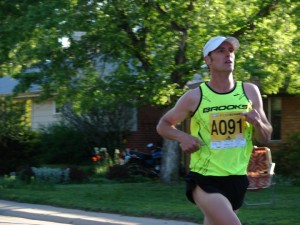Whether you’re a triathlete, a recreational or endurance runner, or even a power walker, your body relies on proper fuel to do what you ask it to do. Training will take you only so far, no matter how religiously you do it. Here’s a surprising statistic I mentioned last week: nutrition counts for 80 percent of athletic training.
 A total of 45-65 percent of runners’ and walkers’ diets should be carbohydrate-rich foods. Carbs give us quick and long-lasting energy. They’re also easier for the body to use than proteins or fats.
A total of 45-65 percent of runners’ and walkers’ diets should be carbohydrate-rich foods. Carbs give us quick and long-lasting energy. They’re also easier for the body to use than proteins or fats.
I’ve always been an advocate of eating whole-grain foods – breads and pastas, wild rice, veggies, beans and oatmeal – but you must read labels carefully. Whole wheat does not equal whole grain.
Runners also need “good” fats, typically 20-30 percent of daily intake. Fat is energy for muscles, once quick-burning carbs have been used. Avoid trans fats. Heart-healthy omega-3s come in walnuts, flax seeds, cold-water fatty fish, soybean and canola oils and even tofu.
Don’t forget protein. A total of 15-35 percent of a runner’s diet should be lean proteins such as fish, poultry, low-fat dairy, nuts and seeds. Avoid foods high in saturated fats and cholesterol.
Find the percentages that work for you, and remember: hydration is key to the formula, and timing is everything. Drink early: do NOT wait for thirst to set in. Think of hydration as a pro-active commitment, not as a fix for thirst. Watch your urine: if it’s pale, you’re drinking enough water.
Always choose a pre-exercise meal that’s low in fat and fiber, is high carbohydrate and includes moderate protein. That’s the formula for endurance and energy.
While running, consume approximately 8 ounces of water every 15 minutes. If you’re exercising longer than an hour, alternate water and Gatorade about every 15-20 minutes. For high intensity workouts, I also suggest a sports drink like G2 (Gatorade2).
After running, you need 3 cups of fluid for every pound lost. Your body also needs protein and carbs (like chocolate milk and trail mix). A protein boost within 15-20 minutes of ending your workout will dramatically affect how your muscles rebuild and replenish.
The time period right after exercise – your short-term “recovery” window – is the most critical for improving your body. Training breaks down muscles, literally, and depletes natural energy stores (glycogen). During recovery, muscle tissue begins to repair and in so doing, strengthens. Energy replenishes.
Timing is key. Your short-term recovery window is only about 45 minutes, and can be wasted during a post-workout chat and/or drive home. Once this window closes, your muscles will no longer be receptive to the nutritional assistance you could have provided.
Bottom line: have a snack immediately following a workout that contains carbohydrate and protein, for this critical period. You’ll start to see a real change in your muscle tone, endurance and energy.
A good post-exercise meal, within 60-90 minutes, could be salmon, brown rice, broccoli, peppers and carrots. Let your body enjoy long-term recovery on “no-workout” days, while you focus on a healthy diet. And don’t skip meals. I personally eat six small meals a day.
Next week: nutrition for swimmers.




